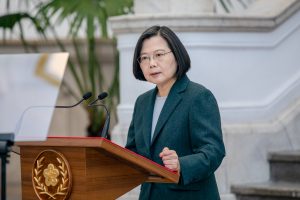Last week, Chinese diplomats based in India apparently took notice of the Indian media’s coverage of Taiwan’s successful management of the novel coronavirus disease (COVID-19) pandemic. Taipei’s monitoring of the situation in Wuhan, where the SARS-CoV-2 virus is thought to have originated, back in December resulted in a highly successful containment strategy, with just 373 confirmed cases of the disease as of this writing (with five confirmed deaths).
In a statement on March 30, Ji Rong, a spokesperson at the Chinese Embassy in India, took aim at “Indian media articles” calling for Taiwan’s participation in the World Health Organization. Taiwan does not officially participate at the WHO. “There is but one China in the world and the Government of the People’s Republic of China is the sole legitimate government representing the whole of China,” Ji said, adding that “The One-China principle is a widely accepted consensus of the international community including the Government of the Republic of India.”
The rest of the statement went over the usual talking points about how the mainland has supported public health in Taiwan. The statement pointedly criticized Taiwan’s incumbent Democratic Progressive Party government, saying that the party was “stubbornly adhering to the ‘Taiwan independence’ separatist stance.” The statement, of course, gave little credence to the notion of a free media, implying that the Indian press should respect the “widely accepted consensus of the international community including the Government of the Republic of India” regarding the One China principle. (India officially recognizes Beijing and maintains unofficial ties with Taiwan, like most countries.)
The episode underscores what might be a substantial wrench in Beijing’s strategy since 2016 to shrink Taiwan’s international space. The most obvious way in which China has sought to do this is by collapsing the so-called “diplomatic truce” with Taipei and plucking away many of Taipei’s diplomatic allies (most recently, the Solomon Islands and Kiribati). The COVID-19 pandemic, however, has drawn as sharp of a contrast between China and Taiwan as possible.
Last week, Taipei announced that it would donate as many as 10 million face masks to several countries. “We need to step up cooperation, and that means sharing experiences and materials, and working together to develop treatments and vaccines,” President Tsai Ing-wen said. “We will donate surplus masks and other supplies to our allies and countries hit hardest by COVID-19. These supplies will go to medical workers on the front lines who are working around the clock to save lives” she added.
Meanwhile, across the world, Beijing is largely being held to task for its role in obscuring the intensity of the initial outbreak in Hubei province while Taiwan is being celebrated as a model of public health. It still remains too early to prognosticate on the geopolitical consequences of COVID-19 in Asia, but it’s clear that Taiwan is making the most of the opportunity as well.
































